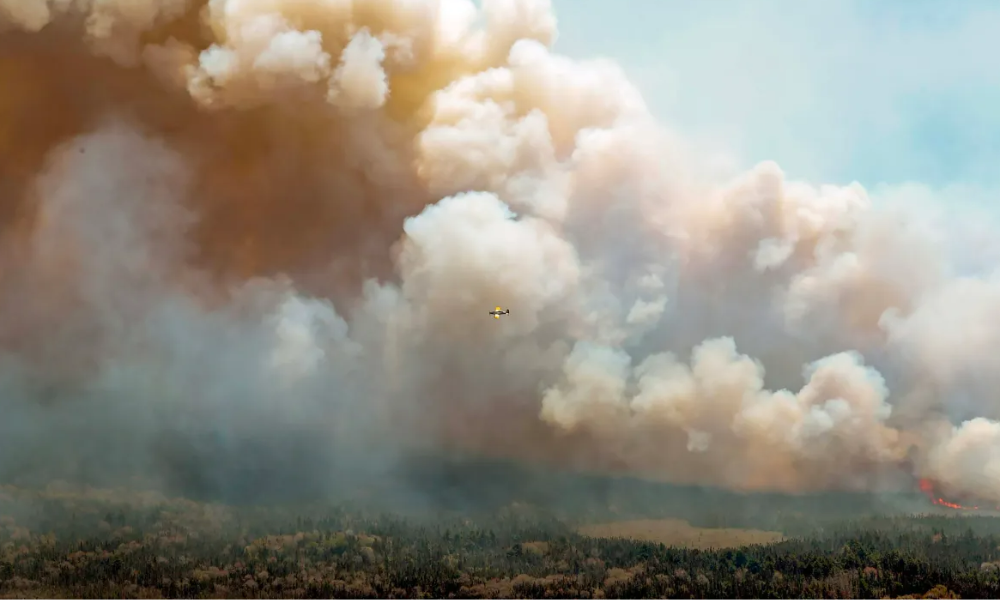Farm safety expert offers emergency preparedness advice

Wildfires raging in Nova Scotia, particularly near the city of Halifax and its surrounding rural areas, have raised critical safety concerns for farmers, as well as other sectors of the economy. Katie Keddy, president of Farm Safety Nova Scotia, says this emergency sheds light on the additional risks farmers face and says emergency preparedness is a critical challenge that must be taken seriously.
"What this has done is put the risk of wildfires at the forefront of another worry that we could be facing if we don't get rain soon," says Keddy. The current battle against the largest fire in Nova Scotia's history in Shelburne, covering over 24,000 acres, underscores the urgent need for preparedness. Farmers in the outskirts of Halifax have had to grapple with decisions concerning the safety of their livestock, making wildfire risks a top priority.
When it comes to mitigating these risks, Keddy outlines several practical measures. "Reducing combustible materials surrounding farm structures is crucial," she says. This includes addressing potential hazards such as chemical storage, fuel tanks, pallets, and hay. Using fire-resistant building materials for new constructions is also recommended, advice that could also be applied to the construction industry as it creates new housing developments.
Keddy suggests, "for farmers who have irrigation systems available, strategically placing them during dry years can be beneficial." Additionally, installing sprinkler systems in larger buildings and housing can offer added protection.
Emergency preparedness is vital not only for wildfires but also for other natural disasters like hurricanes. The memory of Fiona is still fresh in Keddy’s mind, and she advises farmers to have fireproof safes containing important documents, adequate insurance coverage, and yearly discussions to review emergency plans. She notes, "we recommend photos as well...these are just good practices to have in your business, no matter what the potential risks could be."
Multiple access roads and employee training for emergency situations are also emphasized. Clear communication, including instructions in the languages of seasonal workers, is essential to ensure everyone is on the same page.
Reflecting on the readiness of health and safety leaders in facing such emergencies, Keddy notes the progress made but acknowledges the need for continued efforts. "If you asked me 10 years ago, I probably would have said no," she admits when asked if she thinks health and safety leaders take the threats posed by climate change seriously enough.
However, lessons from the COVID-19 pandemic, hurricanes, and wildfires have prompted a shift in mindset. Keddy believes, "we're learning a lot each and every time." Nevertheless, she stresses the importance of dedicating more time and effort to ensure all producers have emergency plans in place.
The severity of the wildfires hitting areas close to the city core in Halifax has been a shock to residents. Keddy says, "not in my lifetime...has this been seen before." The emotional toll on farmers, who consider their livestock their pride and livelihood, is immeasurable.
The recent incident involving the release of horses due to the unavailability of trailers highlighted the difficult decisions farmers face in emergency situations.
Keddy expresses gratitude to the first responders who provide critical assistance during disasters and emphasizes the need for collaboration. She believes that provincial organizations should work closely with responders to equip them with essential information for safe operations on farms during emergencies.
The wildfires in Nova Scotia serve as a sobering reminder for farmers and health and safety professionals to prioritize emergency preparedness. Climate change has heightened the frequency and intensity of extreme weather events, necessitating comprehensive plans for businesses, particularly in the agricultural sector. By implementing proactive measures such as reducing combustible materials, using fire-resistant structures, and training employees, farmers can safeguard their livestock, properties, and overall well-being.
As Nova Scotia continues to grapple with ongoing wildfires, it is imperative for communities and industries to come together to address the safety challenges posed by climate change. By doing so, they can ensure the safety of both humans and animals in the face of evolving environmental risks.





